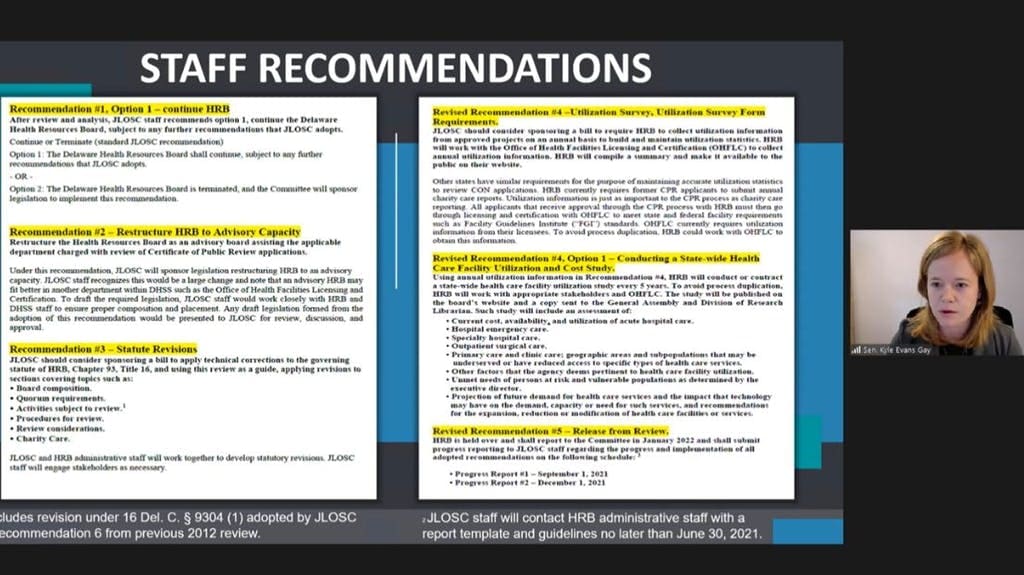The state will keep its controversial Health Resources Board, which votes on new medical facilities and services, but transition it to an advisory board only with its staff doing its own research and making final decisions.
The vote by the Joint Legislative Oversight and Sunset Committee came Tuesday morning after another lively meeting, a full court press by the Department of Health and Social Services to keep the board, and recognition by opposition that they didn’t have enough votes to kill it.
That number was seven. If the board couldn’t be killed, then the next best thing is to choose the option that kept the board, but enforce changes, said Sen. Brian Pettyjohn, R-Georgetown, and senate minority whip.
“We need to get that off the table,” he said during Tuesday’s meeting, “so that we can … actually recommend some of those subsequent changes that we all know has to happen to the board.”
A Sunset staff report largely condemned both the operations and effectiveness of the Health Resources Board, which operates the Certificate of Public Review that oversees applications for new health care services or facilities.
Error, group does not exist! Check your syntax! (ID: 11)
The board has a huge impact on which services are offered where, and ultimately what people pay for health care and health insurance.
Supporters say the board and public review process is needed to control health care costs, keep them as low as possible and make sure they serve the public at large rather than cherry picking only wealthy or insured people.
Those opposed say the board and process create an unnecessary barrier to a free market, drive up health care costs by preventing competition that could drive them down and makes decisions that can’t or aren’t unjustified, like refusing to allow a free-standing emergency room in Georgetown.
“The conversion to an advisory board is an acknowledgement of the dysfunction of the Health Resources Board and the Certificate of Public Review process,” said Dr. Christopher T. Casscells, health policy director for the Caesar Rodney Institute and an advocate for killing the board.
“But I am concerned that it consolidates the focal point for lobbyists,” Casscells said. “In other words, it’s going to make lobbying for the hospital monopolies much easier because they only have to go to a small pinch point to get done what they need done.”
Under the five recommendations that the Sunset Committee approved Tuesday was shrinking the board of 15 to 5 or 6.
The Sunset staff will work with the Department of Health and Social Services to finalize what that and other changes will be. Rep. Sherry Dorsey Walker, D-Wilmington South, wanted to be sure the board would be reassigned to the Office of Health Facilities Licensing and Certification. Staff member Amanda McAtee said all that would come up in discussions with DHSS.
The changes will require law changes because the current system is written into state law. The committee approved changes to the board composition, quorum requirements, activities subject to review, procedures for review, review considerations and charity care.
Any new laws created will be brought to the Sunset Committee for approval before going to the Delaware General Assembly.
The Sunset Committee also ordered the Sunset staff to create a bill to create a utilization survey to track expenses and costs. The committee also asked the board to create a state-wide Health Care Facility Utilization and Cost Study every five years. Other states have similar programs.
The report would be published on the board’s website and include “an assessment” of current cost; availability utilization of acute hospital care; hospital emergency care; specialty hospital care; outpatient surgical care; primary care and clinic care including areas and subpopulations; unmet needs of persons at risk and vulnerable populations; projection of future demands; and other unspecified factors that the agency deems appropriate.
The final recommendation approved Tuesday requires the Health Resources Board to submit progress reports Sept. 1 and Dec. 1.


Betsy Price is a Wilmington freelance writer who has 40 years of experience.
Share this Post









